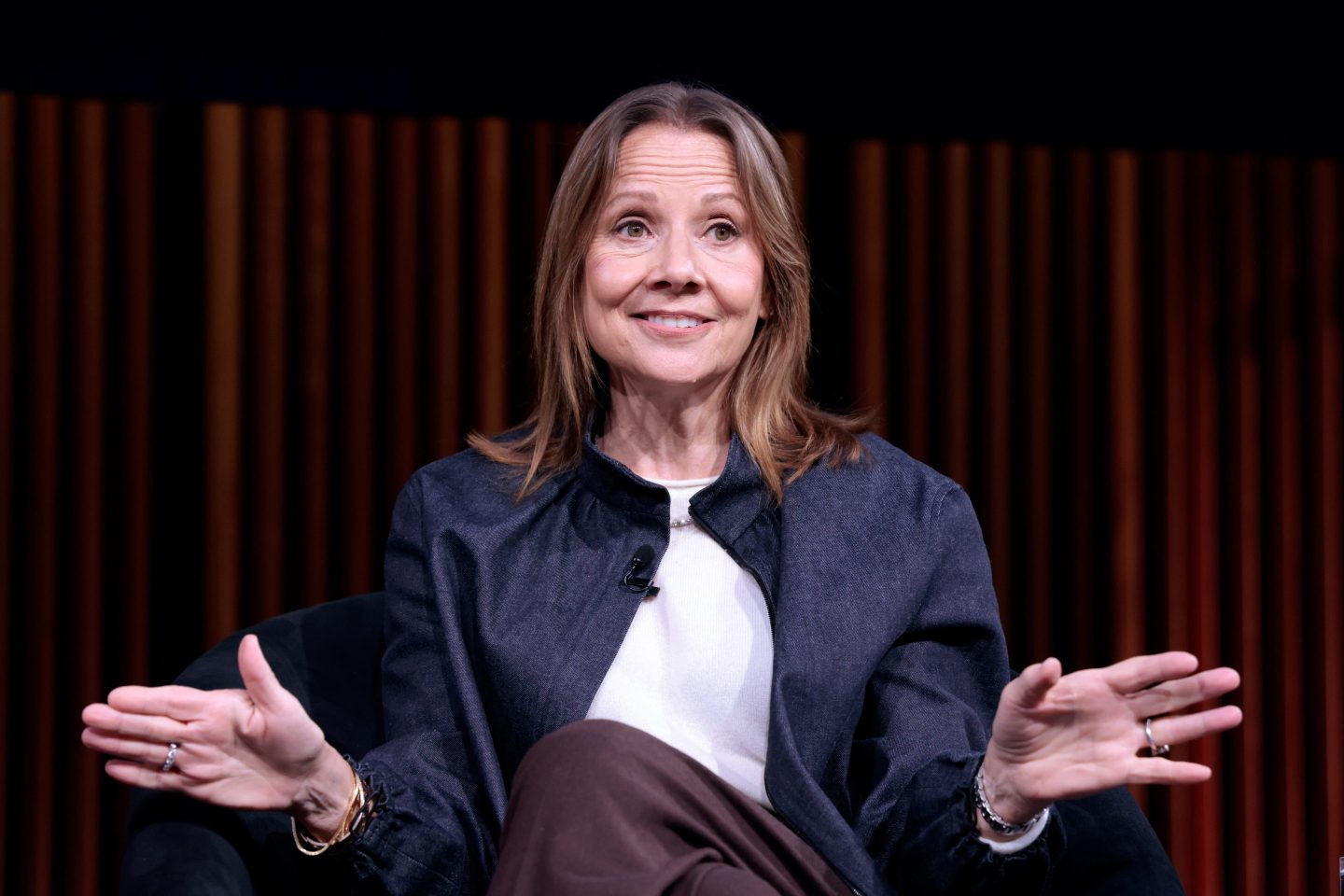Good morning, Broadsheet readers! GM CEO Mary Barra could be a problem for Joe Biden, British Vogue taps Chioma Nnadi as the magazine’s first Black female editorial head, and senior writer Maria Aspan interviews Instacart CEO Fidji Simo about her company’s trading debut. Have a great Wednesday!
– Delivering the goods. It took two very long, tumultuous years, but this week, CEO Fidji Simo finally pulled Instacart onto the public markets.
On Monday, the grocery-delivery company priced its long-awaited IPO, raising roughly $660 million and valuing itself at about $10 billion. That was only a quarter of the company’s eye-popping private valuation in 2021, when private investors believed that Instacart was worth $39 billion. But if you ignore that massive discount, Instacart’s Nasdaq debut was generally a success. Its shares rose more than 12% on Tuesday, to close at $33.70 on their first day of trading, and signaled a further thawing of the long-frozen IPO markets.
“While it has been a long time coming, it has also given us a chance to build a much stronger business,” Simo told me in a brief interview this week.
“When I took over as CEO, there was this big question about whether Instacart would be just a pandemic fad,” she added. “But the last two years gave us a chance to completely transform the business.”
She’s done that by following through on many of the strategies she first laid out for me in 2021, when I profiled Simo for Fortune at the start of her Instacart tenure. The former Facebook senior executive replaced founder Apoorva Mehta as CEO in August 2021, with the goal of building Instacart into more than just a grocery-delivery app powered by low-paid gig-economy workers.

The pandemic had sent the startup’s delivery business soaring, but as lockdowns eased and customers stopped being willing to pay high delivery fees to have someone else shop on their behalf, Instacart needed to develop other ways to make money. Simo, a veteran marketer, took over with plans to build up Instacart’s advertising business and third-party tech services for the retailers that use its platform.
She has broadly succeeded: In 2022, advertising accounted for $740 million in sales, or nearly a third of Instacart’s $2.6 billion in total revenue. The company turned a profit of $428 million in 2022, compared to a year-earlier loss of $73 million.
Still, Simo has more work to do at Instacart. Total number of grocery orders—still at the core of what Instacart sells—were flat in the first six months of 2023. Then there are the expectations of Instacart’s board—including representatives of its private investors. (That group no longer features the founder she replaced: Mehta officially stepped down as chairman this week, more than a year after Instacart said he would leave the company upon the IPO.)
While Simo glosses over questions about the IPO’s valuation write-down, she acknowledges that she still has plenty of work ahead.
“Markets will ebb and flow. But what I do control are the business results that we put out,” she says. “We have been able to really make a big turnaround in the financial results of the company—so from that perspective, the board is very happy.”
Maria Aspan
maria.aspan@fortune.com
@mariaaspan
The Broadsheet is Fortune’s newsletter for and about the world’s most powerful women. Today’s edition was curated by Joseph Abrams. Subscribe here.
ALSO IN THE HEADLINES
- Barra barrier? General Motors CEO Mary Barra is currently drawing criticism for being the highest paid CEO of the now-striking Detroit Three automakers, whose workers are now on strike. That could become a problem for President Joe Biden. Barra is one of the president’s closest allies in the private sector and has been paramount to his vision for a widespread adoption of electric vehicles, but their alliance stands in the way of the pro-union sentiment he campaigned on. Politico
- Saving seats. With elections just a year away, Indian Prime Minister Narendra Modi reintroduced a bill yesterday that would reserve one-third of all lawmaker positions for women. Women currently occupy 15% of India's parliament. Bloomberg
- Vogue's new look. Condé Nast announced that journalist Chioma Nnadi, who currently runs Vogue's U.S. website, will replace Edward Enninful as head of British Vogue when he exits the role in early October. Nnadi will be the first Black woman to occupy the fashion magazine’s top editorial spot, which will be renamed “head of editorial content.” The Guardian
- Professional party police. When Naba Banerjee joined Airbnb in 2020, party-related tragedies and property damage had left the rental company with hesitant hosts and an untrustworthy pool of renters. Banerjee, now head of Airbnb's trust and safety team, stepped up to the plate. After banning more than 320,000 users while implementing a party-predicting AI algorithm, the number of parties reported on the app has shrunk by 55% in two years. CNBC
- Brand monetization. YouTube suspended Russell Brand from monetizing his channel yesterday as the performer faces several sexual assault accusations. The BBC has also removed some Brand content from its archives. Brand has denied the allegations. AP
MOVERS AND SHAKERS: Recharge Capital appointed Margaret Wang as managing partner. TIME named Shyla Raghav as chief climate officer.
ON MY RADAR
Alex Cooper went from raunchy podcaster to Gen-Z's Barbara Walters Rolling Stone
How Glossier made effortlessness a billion-dollar brand The New Yorker
The girlies know: ‘Oppenheimer’ was actually about us The New York Times
PARTING WORDS
“The thing I’ve been most surprised by lately is how much respect I’ve been getting from these middle-aged white dudes.”
—Director Nia DaCosta on directing the upcoming Marvel Cinematic Universe entry The Marvels and the power of being able to pick her on-set team
This is the web version of The Broadsheet, a daily newsletter for and about the world’s most powerful women. Sign up to get it delivered free to your inbox.












